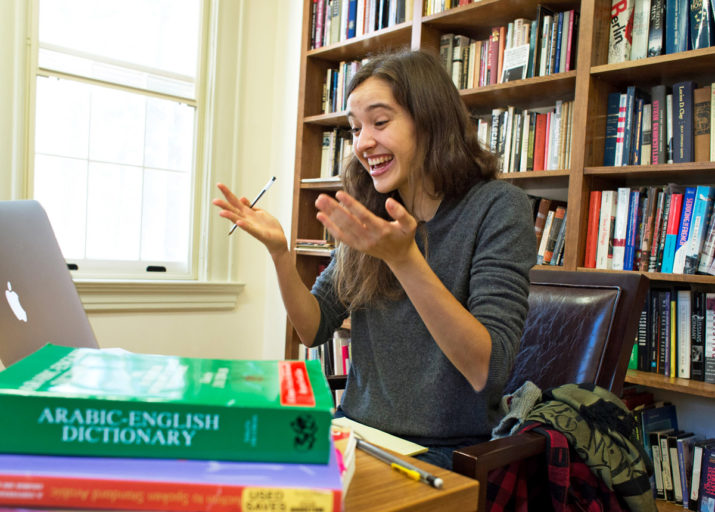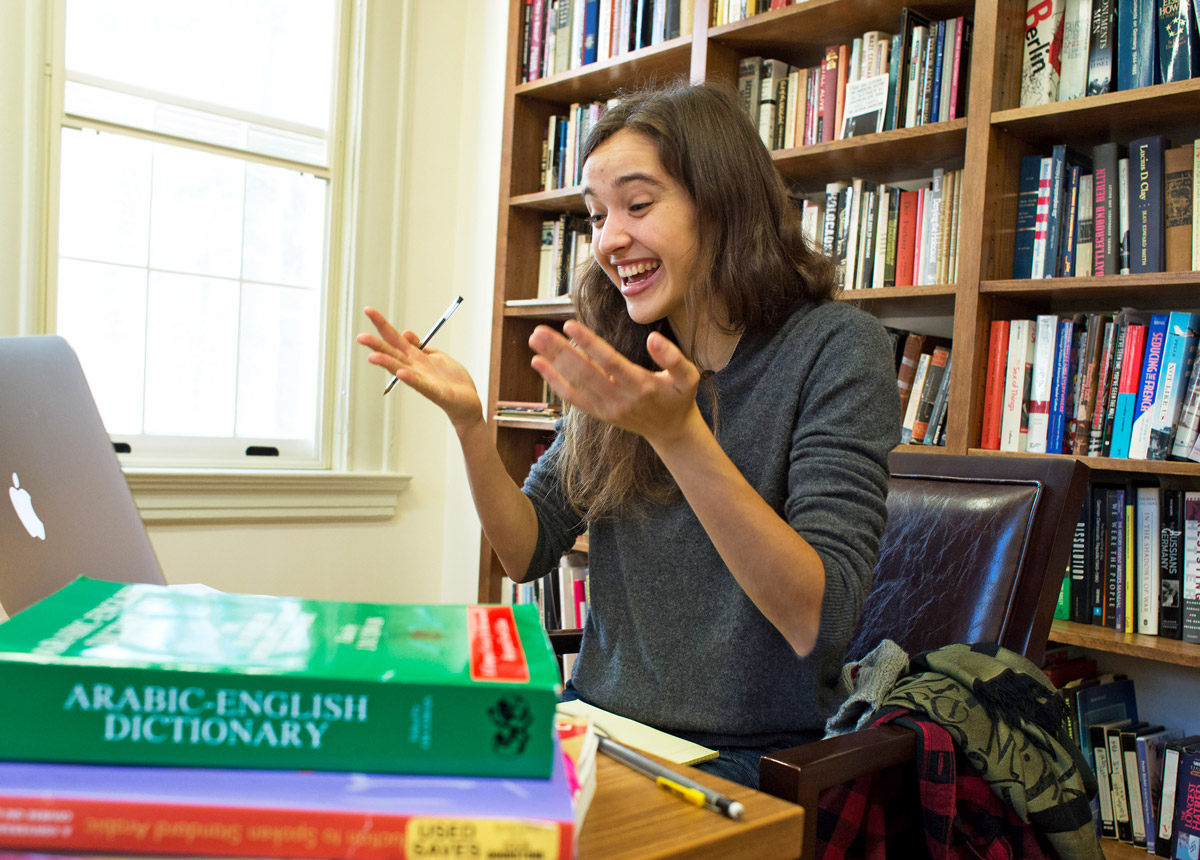
Conversations Unbound: Student Engagement with Migration through Language Learning

This is part of our special feature on forced migration, Narration on the Move.
This is part of our campus spotlight on Vassar College.
Conversations Unbound (CU) is an organization that connects college students learning languages with forcibly displaced individuals who work as online tutors. As an initiative launched by Vassar students under Professor Maria Höhn’s guidance as faculty mentor and founder of Vassar Refugee Solidarity (VRS), CU embodied VRS’s commitment to rethink existing vertical models of humanitarian engagement with displaced populations and to innovate horizontal models that allow for more democratic interactions. Forcibly displaced individuals were to be recognized as holders of knowledge and empowered as paid language tutors. From its beginning as a student-led initiative that brought together Vassar students, faculty, and alumni in a new model of the liberal arts’ engagement with global issues to its present state as an accredited 501(c)3 nonprofit in the US, its mission has been to facilitate cross-cultural and cross-continent relationships as well as language proficiency and appreciation among students. In this collaborative article, CU founder Elise Shea (2019 Vassar graduate) discusses the structure of the organization and how it balances tutors and language learners’ needs. For readers interested in the question of how an enterprising social organization like CU fits into the classroom, two professors, Camelia Suleiman of Michigan State University and Vassar’s Eva Woods, discuss their experiences integrating CU lessons into their syllabi. Suleiman speaks from her experience using CU in her Arabic language and Women’s Studies courses, and Woods shares her reflections on working with CU in Spanish-language classrooms.
—Matthew Brill-Carlat for EuropeNow
Elise Shea
With increasing numbers of forcibly displaced people, daunting projections of future displacements (300 million forcibly displaced by 2030, according to UNHCR), and heightened levels of societal resentment towards these displaced communities, Conversations Unbound (CU) was established to meaningfully engage college students in this global issue while simultaneously providing job opportunities for forcibly displaced people.
CU empowers individuals who have been forcibly displaced as Arabic, Spanish, or cultural course tutors for college students. Students are paired with tutors to practice conversational skills and learn more about each other in the process. These one-on-one online conversations are integrated into course material as a component of the student’s final grade, while CU tutors receive payment after each session. Thus, CU’s program design strives to benefit both displaced people and college students. We aspire for our programs to enable a robust educational experience for students by encouraging cross-cultural exchanges. Our surveys suggest that we are succeeding in this mission: In 2019 alone, over 92 percent of our students reported that CU helped improve their speaking ability; over 95 percent reported that CU added a unique and beneficial component to classroom language learning; and over 81 percent reported that CU helped them feel more comfortable in class. In addition to helping students, CU has made a difference in the lives of tutors, enabling tutors to earn over $13,200 in income.
Initiated in 2015 at Vassar College during the height of the “refugee crisis,” I founded CU as an undergraduate, growing the idea within Vassar Refugee Solidarity (VRS), and soon forming CU into an independent 501(c)3 non-profit organization. While initially developing within VRS, CU was nurtured by the collaborative VRS student-professor team that strongly encouraged innovative and dynamic entrepreneurial engagement and provided access to a rich array of resources. In particular, Professor Maria Höhn provided generous mentorship and guidance as she connected the CU team with key networks such as the Vassar alumnae/i community, educational institutions, and for-profit companies.
Of the Vassar alumnae/i network, many rallied to propel CU. Thanks to Professor Höhn and then-Vassar President Catherine Hill, I connected with Jim Leu ‘94, Regional Director of Business Operations for East and South East Asia at italki, which is an online language-learning platform. Through this partnership with Jim and the italki team, CU became an easy-to-use program for university language-learners and forcibly displaced tutors. CU thrived thanks to the dedicated mentorship of Vassar alumna and corporate lawyer, Alisa Swire ‘84, who helped propel CU into the nonprofit world and provides continued mentorship as a CU board member.
Furthermore, CU connected with a forcibly displaced populations through key partnerships with non-profit organizations worldwide, namely Small Projects Istanbul, ReDI School for Digital Integration in Berlin, The American University of Kurdistan in Duhok, ECHO100 Plus in Athens, and Sin Fronteras in Mexico City. This global, cross-sector collaboration set the foundation for CU’s success.
Since this beginning, CU has blossomed into a team of fourteen dedicated staff members who run the organization part-time while pursuing their educational degrees or other full-time careers. All CU staff members are language learners: together our team speaks Arabic, Hebrew, French, Spanish, Polish, Russian, Chinese, Japanese, Thai, and English. We all have first-hand experience learning languages in a college setting, so we know the importance of having one-on-one conversational experience and how to integrate our programming in new language courses. Additionally, we are guided by the expertise of our board of directors who are professors, lawyers, entrepreneurs, marketing experts, language tutors, program coordinators, and community organizers.
At our core, CU draws inspiration from the tutors themselves—exceptional individuals who have experienced unimaginable hardship, yet remain incredibly resilient, entrepreneurial, and generous. Take, for example, Alaa Khabaaz. After leaving the political turmoil in Syria and resettling in Turkey, he has established himself as an incredible online Arabic language tutor, teaching nearly 700 lessons to over 90 different language-learners to date. Inspired by this talent and determination, CU seeks to empower those like Alaa who want opportunities to continue to improve their lives and impact their students. Speaking to the benefit of CU, Subhi Moazzen, a CU Arabic tutor explained, “It is a great pleasure for me to meet with non-native speakers who are passionate about learning the language. I feel that they add a value to my life here.” Currently, CU’s tutor team is comprised of tutors from Syria, Iraq, Egypt, Burkina Faso, Mexico, and Venezuela who now live in Syria, Saudi Arabia, Turkey, Germany, Mexico, and the United States. Furthermore, our tutor team is now 50 percent female. CU strives to make our program accessible to women who have been forcibly displaced, understanding that these women face increased barriers to economic opportunities due to gender biases and their forced migration status.
CU’s tutors have also played a major role in the initiation, development, and growth of CU. Our team works with our tutors to create a program that provides meaningful financial support, respects their cultural norms, and enables them to receive payment despite limited access to financial institutions. Our tutors are consulted regularly for feedback on how to improve our programs for students and our impact on their communities; additionally, we hold annual webinar workshops to provide a space to listen to our tutor’s thoughts and bring our tutor and administrative teams together.
With this diverse support network as CU’s backbone, the organization has developed a seamless program that integrates organically into professors’ course curricula. For example, students studying Arabic or Spanish might have homework assignments to practice their conversational skills with their CU tutor, while students might discuss their Women’s Studies course content in English with their tutors, engaging in rich conversations about women’s roles in Arab society. CU tutors bring their unique cultural perspective and experience of forcible displacement to these CU sessions—material that simply cannot be taught through textbooks. As evidenced by our exceptional approval and improvement statistics, we aspire to provide a rich educational experience for students by encouraging cross-cultural exchanges. We also intend for these conversations to create a space for forcibly displaced people to be the leaders in the conversation about the “refugee crisis,” elevating their voices, experiences, and knowledge.
By empowering forcibly displaced people as tutors, CU creates job opportunities, which helps improve this population’s financial stability. Tutors are paid per session and receive 100 percent of their earnings. They are also able to determine their availability and work with students on their own time, allowing CU to fit alongside other jobs and responsibilities as they integrate into new host communities. Many of CU’s tutors have become successful online tutors, earning over $500 per month through tutoring sessions.
Just as importantly, CU strives to continue to provide rich educational programming for students. Contemplating the value of CU, Vassar student Simaya explained, “You get to communicate with someone one-on-one—someone who is very much embedded in that experience—and be critical of yourself and the views that you hold at a distance and hold yourself accountable and learn from them.”
Eva Woods Peiró, Vassar
In a setting historically committed to protecting the hierarchies of and access to knowledge, CU nods modestly to the need for reparations. It constitutes a linguistic platform endowed with an equity lens, seeking to shift the emphasis on migration from one of invasion and unidimensional portraits to one on dialogues in which speakers, cognizant of their social identities and privilege, mutually shape understandings and produce meaning (see Deetz and Simpson 142-143).
In 2017, I piloted CU in my senior seminar, “Decolonizing Digital Culture.” One hundred percent of students polled said they enjoyed the sessions and that the conversations had helped improve their language skills. Since then I have been implementing CU each semester in intermediate through advanced courses. Depending on the level, I require students to complete anywhere from six to ten thirty-minute sessions. Part of the challenge, and ultimately the most rewarding aspect for the student, was learning how to navigate a dialogue without prompts, and involving creatively taking turns in listening and sharing. Real life (RL) listening and learning from a person who embodies the experiences we read about entails a wholly different cognitive impact. The reciprocity and the sensuous stimulation leave a different trace in our learning trajectory. But I also recognize the difficulty of unexpected turns of conversation, so in order to alleviate any potential student anxiety, I buttress the conversations with in-class pre- and post-conversation activities.
In order to prepare, reflect on and analyze the conversations, I ask students to submit three short written reflections and to informally present three times in class in Spanish, first in groups, and then to the whole group. The reflections, akin to journaling, encourage free writing and allow students to describe how they feel or what they talked about with their tutor. Somewhat differently, the informal presentations (first discussing in pairs and then sharing back to the circle, or “pair-and-share”) guide them to compare the joys and challenges of having these conversations. These components are graded, but the actual conversations with the tutors are not. Rather than projecting a pre-constituted idea of quality onto the conversations, the point is to understand the conversations as a process that grows and, like language acquisition, becomes cumulative. For the actual student-tutor conversations, I refrain from assigning prompts so that the tutors do not feel obliged to prepare before a session, given that they are paid for their face-time with the student. I have been honest with students about this concern when they have requested prompts. I set up the pair-and-share to brainstorm possible conversation prompts that draw upon the content of the class, whether that be digital culture, migration or fascism. My courses expose students to these socio-political issues through historical texts and the contemporary media, and ask them to engage with these sources by crafting discussion questions and practicing different forms of writing and media production.
Students, in other words, can translate any of these course components into material for their conversations with tutors. But I also explicitly discuss with them the importance of applying group discussion norms to their conversations, such as active listening, and awareness of how much or how often one speaks (if one is extroverted) or more fully bringing oneself into the conversation (if one is introverted). I have found that encouraging students to empathetically participate in the joint creation of the student-tutor conversation, builds confidence and accountability, and most importantly, provides real life enactment of inter-subjective creation of meaning.
The experiential component of CU is transformative. One of our tutors was from the local community. She came to class in person in the second week so that students could meet and know something about her before beginning the conversations. Yet even when embodied visits are not possible, learning face-to-face, or in a screen to screen-close-up about their tutor, whether a twenty-year-old from Venezuela or a middle-aged person from Mexico living in Ohio, embeds classroom learning within a transcultural network and significantly enhances impact on student learning. We are not saying that conversations are not technologies themselves, (Pauly 245) but that RL conversation engages with difference in a way that “surfing diversity” online or shopping in the “tourist language textbook” cannot (Kramsch 301-02). A conversation cannot evaporate the power differentials in play between students and tutors. But having to “face” inequities, disallows our automatic retreat into the bubbles of privilege and impunity that characterize the seemingly inescapability of consumer-driven life. It is no wonder that conversational television series such as The Office, have resurfaced as cult hits with Millenials who are searching for modes of interactivity within their screen worlds.
Our mediascape inundates us in one-way models of communication that “privilege the self at the expense of the other” (Deetz and Simpson 157), assuming that “common ground” can be found in a conversation characterized by asymmetries of social power (141-42). Building relationships with people in real time, with real people, across ethnic, race and gender lines, and across borders and screens, might not change our world, but it could potentially change our expectations of it, and maybe even the way we imagine it.
Camelia Suleiman, Michigan State University
I had the pleasure to be approached in Fall 2017 by Dean Christopher Long, in the College of Arts and Letters at Michigan State University, about Conversations Unbound. The vision behind the project was simply to connect MSU students of Arabic with Arabic-speaking language partners. The language partners came mainly from Syria and most were either living in Turkey or still living in Syria. Dean Long committed the College to pay these partners through Conversation Unbound. I discussed the project with second and fourth year Arabic students, and they were excited to participate. At both levels, students were asked to converse in Arabic via Skype, seven to ten times per semester. Students wrote short journal entries of their conversations and once every two weeks we dedicated class time to discussing their conversations and reactions. We tried to link the conversations to topics we were discussing in class — for instance, ethnic groups in the Middle East, minorities, Islam, women, music, historic figures — so that the vocabulary was somewhat familiar. It was a great opportunity for students to practice their new vocabulary.
From the feedback I received from faculty and students, the students felt that the program humanized what they often heard on the news. Students’ conversations made the region of the Middle East and the strife in Syria feel less remote. Arabic tutors testified to the cost of war, dislocation, the break-up of communities and the state, and they explained the struggle to redefine oneself when everything collapses. As a result of the success of the project, we continued with it for a second year in a row. This time, I added students from my Voices of Arab Women course in Women’s Studies. These conversations were carried out in English, and therefore, the students might have been more able to discuss difficult topics in depth. They were free to discuss anything they liked, and most opted to discuss their daily lives to “break the ice” at the beginning, then as time went on, they began talking about their and their partners’ interests. We dedicated weekly discussion time for students to talk about their experiences. These conversations were always lively and interesting. We linked them to class readings on gender relations in the Middle East. Students also had to write weekly journal entries discussing their experience and linking it to class discussion. Some of the students ended up conversing with men, since we decided as a class that in order to have a comprehensive picture of gender relations, it would be good to converse with men as well. The effect of this was tremendous. I will cite some of the students’ reactions:
I didn’t really think I would get over my nervousness talking on Skype with a Syrian man living in Turkey. But, I am happy that I overcame my nervousness. What is really interesting is that even though we are from completely different cultures, we are able to discuss things without getting upset or angry at the other person’s culture. I think that we both have a mutual respect for cultures that are not ours. He also told me that he is learning a lot about feminism due to the sessions we have. Previously, he had never truly considered the role that feminism plays in his life, but also the lives of people around him. Hearing that made me really happy…. He was also telling me that he had never had cereal before. I understand that cereal is a western food, but I had thought that it was everywhere. The same is with Pop Tarts. He had never heard of them before. It made me feel ethnocentric to assume that popular things in my culture would also be everywhere else.
On a more serious note:
Chronicling the conversations with my partner taught me much about the art of conversing, building rapport, and practicing cultural awareness… It took my partner a long time to talk about Syria, and I found his perspective especially interesting because he still lives in Aleppo with his family. He described to me his daily routine, getting up early for the dawn prayer at the mosque, and then going back home for a nap, followed by a trip to the grocer. As for his afternoons, he usually spent them reading. Having a routine in such circumstances seemed like an absurdity, but then he stated that “life goes on, if you know what I mean. It is what it is.” I initially felt impressed by these words, and thought that they are an expression of resilience and strength, but then I thought again. it is possible that he did not wish to reveal the depth of his loss. Moving forward maybe the only way of healing and coping. He fondly spoke about the “old days,” where he would visit his village outside of Aleppo every week. What used to be a thirty minute drive is today a dangerous ten hour process of moving through checkpoints. And while he moves somewhat freely around Aleppo, his wife’s movement is more limited due to the potential dangers. It made me reflect as to how women are more vulnerable at times of unrest.
A third student:
My tutor recounted some of the most horrifying events in the Syrian Civil War: the early spark of it in the city of Dar’a. Pain and outrage outlined my tutor’s face when she recounted these fateful events.
She added
My tutor shared with me what it means to be a Muslim woman in Europe and I shared with her what it means to be Muslim in the US I had never thought about this before and I am grateful for the knowledge. She introduced to me what Syrian activists are doing in Europe, such as Sirin Hashmo, an engineer from Syria who made the movie Hajar, which received thousands of views. The film touches heavily on immigration and the concept of motherland. She emphasized how difficult this can be especially considered how the media represents Syrian immigrants, and Muslims in general. The idea came to her after seeing many Syrian refugees adjusting to their new countries. She also told me about the 22-year-old Ala’a Salah, the Sudanese activist who led protests against the regime and the President, Omar Al-Bashir. It was important to me to understand what she was singing “our religion says, revolution! When someone sees wrong and evil, revolution! They cannot remain silent, revolution!”
Elise Shea is the Founder and President of Conversations Unbound and a Program Assistant with Equal Access International. Dedicated to issues of displacement and humanitarian aid, Elise has worked for the Refugee Investment Network; researched refugee integration schemes in Berlin as a Ford Scholar; and volunteered at a Greek refugee camp with ECHO 100Plus. Elise holds a BA from Vassar College with a double major in International Studies and French/Francophone Studies.
Camelia Suleiman is the Arabic language coordinator at Michigan State University, and has directed the Arabic Flagship Program. Her research interest is in the area of language and identity in relation to gender, politicians’ use of language in the media, and national identity, in both the American and the Arab countries’ contexts. She is on the editorial boards of ‘Journal of Psycholinguistic Research’ and ‘Journal of Social Distress and the Homeless’.
Eva Woods Peiró teaches at Vassar. Her current projects focus on Spanish film magazines of the 1920s and 30s and contemporary Trans-Atlantic digital cinema with particular attention to issues of surveillance and migration. This year she has been focusing on organizing Undoing Racism workshops. Her contribution to this article has been written in the context of the research project CSO2017-85290-P, funded by the Spanish Ministry of Economy and Competitiveness and co-financed by the European Regional Development Fund. She would like to acknowledge Vassar College students Camelia Manring and Gabrielle Deitch for their essential contributions to the initial drafts of this piece.
References:
Deetz, Stanley and Jennifer Simpson. “Critical Organizational Dialogue: Open Formation and the Demand of “Otherness.” In Dialogue: Theorizing Difference in Communication Studies, edited by Rob Anderson, Leslie A. Baxter and Kenneth N. Cissna, Thousand Oaks, CA: SAGE, 2004 159-174.
Freire, Paulo. Pedagogy of the Oppressed. Trans. Myra Bergman Ramos. New York: Continuum, (1970) 2000.
Kramsch, Claire. “Teaching Foreign Languages in an Era of Globalization: Introduction. The Modern Language Journal 98.1 (2014) 296-311
Pauly, J. “Media studies and the dialogue of democracy.” Dialogue: Theorizing difference in communication studies, Sage, London (2004): 243-258.
Photo:
Published on October 29, 2019.




